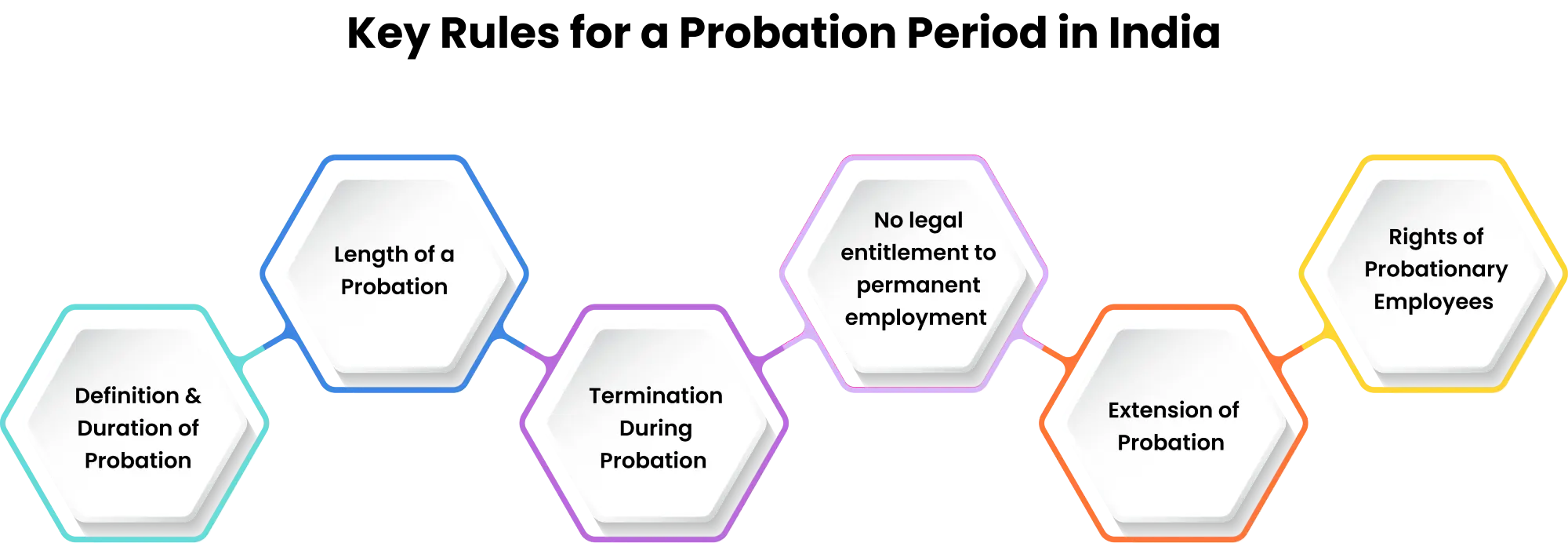Home / P / Probationary Period
What Is a Probationary Period? Importance, Benefits & Rules
When someone starts a job at a new company, there is a good chance they will not be a permanent team member immediately. Most companies have a probationary period - basically a trial period for both sides. During this time, the company will assess the employee's performance, work ethic, conduct, and cultural fit within the organization, while the new employee will evaluate the work environment, expectations, and how well they fit into their job role.
In India, the employer can usually extend the probationary period to twelve months with notice in writing. During this time, notice for termination may be given in the format of a shorter notice period (usually 7-15 days); however, the employee is still entitled to their basic entitlements such as salary, PF, and ESI. Once the probationary period has been completed, the employer is expected to deliver a letter of confirmation stating that the employee is now a permanent member of staff.
For employees, probation is an opportunity to learn the role, adapt to the workplace, and demonstrate their ability to be successful in the role long-term. For employers, this provides a convenient timeframe for assessing an employee's performance and fit with the team before making the employment decision permanent.
The probation period is important for both parties in that it allows companies to ensure they are hiring the right person for the job, while allowing employees to assess whether or not the role is the right fit for them.
If the employee is performing well, meeting expectations, and both parties are satisfied with each other, the employee will usually be confirmed in their position as a permanent employee. If the employee does not achieve an acceptable level of performance, equally, the fit is deemed not right for the employee, then the employer reserves the right to terminate the employment or extend the probation.
What Is a Probation Period?
A probation, or probationary period, is a specific period at the start of employment for the employer to assess the employee's performance, behaviour, and degree of fit for the role.
The probation period is an important technical stage for both employers and employees. It lays the foundation for a potential long-term working relationship. It is not only a test but also a learning and supporting phase to assist new employees in adjusting, learning, and developing their roles.
If handled fairly, transparently, and with ongoing communication and feedback, the organizations will have made a better hire, less frustration, and a long, productive working relationship with employees. Learning the rules, rights, and responsibilities during the probation period is essential for a successful learning and working experience for both the organization and the employee.
During the probation period, employees have time to learn and understand their responsibilities in this role and their new work environment. Employers are considering how well the employee performs the required tasks, how well they respond to feedback, and how well they work with others on the team. This is a standard practice across many companies, especially with a new hire and even internal promotions.
Purpose of Probation Period
Risk mitigation is the primary reason for a probation period. It's the employer's safety net. The employer has the time to see if the new hire is the right fit, without being locked into a long-term situation from the start.
It then similarly gives employees a chance to learn, grow, and demonstrate their capabilities, as they can ask questions, make mistakes, and improve (which is important because it can be stressful when someone is worried that every action they take is being permanently assessed). A probation period is also a learning period.
Importance for Employers and Employees
The probation period is a tool for employers to help them avoid potentially bad-fit recruits down the road. A good probation could save them time, money, and effort - not only in terms of not having to go out and rehire someone else, but even more, not having to experience all of the unpleasant stuff to retrain someone else. It functions in capacity development expectations. If it becomes clear that the employee does not fit the job, you (as the hiring company) can release them with much less documentation.
For employees, the probation period helps the employee experience the role in as broad a way as possible. It can also assist with a better transition into the company and facilitate getting their contemporaries and work area accepted. If employees have all frightfully good probation, it provides more of a settled perspective to first impressions. If the employee feels the job does not suit them, they can leave with less pressure, and that less pressure could help both parties later.
A Fair Trial for Both Sides
What does positive probation look like? A positive probationary experience should have the perspective of being about keeping and developing a service, rather than on a compliance value. A positive probation should be based on fairness, and a positive probation will lead to longer-term employees and satisfaction for both parties. Communication is essential in negotiation, with ongoing dialogue being held regularly, feedback to the company, and a support mechanism being implemented to reach a common goal.
How Long Should a Probation Period Last?
The duration of a probation period differs from company to company. Below are the most common durations:
- 90 days (3 months): This is most typical. It is long enough to determine whether an employee's basics fit and the basic level of performance.
- 6 months: Some jobs have a probation of 6 months, sometimes it is due to the complexity of the job, sometimes it is because of long training phases.
- 1 year: In very rare cases, some companies use a probation period of up to 1 year for higher-level or highly technical roles.
In India, the overwhelming majority of companies use 3 to 6-month durations for probation. The length of the probation must be indicated in the offer letter or employment contract.
What are the Pros & Cons of the Probation Period?
Benefits of Probation Period
For Employers:
- Trial Period: A trial period allows for assessing the appropriateness of the new employee for the role and whether the employee is a good fit for the employer.
- Lower Risk: Generally, fewer barriers for an employer to terminate an employee if the employee is not demonstrating acceptable behaviours or performance.
- Cost-Benefit: There may also be some cost benefit of being able to postpone paying any of the employee benefits or ensure compliance with the employer's commitment to long-term employee relationship commitments while the employee is successively under the probationary phase.
- Performance Evaluation: The probationary period also provides the opportunity to engage in an assessment of an employee's previous experience, if applicable, attitude, skills, and suitability.
For Employees:
- Learning Episode: Employees have the opportunity to learn about the job, the team, and the workplace culture without a commitment before permanent employment.
- Skills Development: Employees also have an opportunity to receive input feedback from management on an iterative work and performance approach during the earliest stage of employment.
- Opportunity to Demonstrate Multiple Capabilities: Employees have the opportunity in the probationary period to demonstrate multiple skills and capabilities relative to the potential employer for permanent employment.
- Exit Options: If it does not work out for any reason, Employees can resign with relatively short notice rather than permanent employment.
Cons of Probation Period
For the Employers:
- Abandoning an Employee Quick: Employees can leave suddenly or with short notice, disrupting workflow
- Training Expense: Valuable time and resources are lost in training if the new employee is only going to work for a short period.
- Lack of Dedication: The employee has no obligation to be dedicated and to contribute until they are confirmed
For Employees:
- Job Insecurity: There is no certainty of a permanent position until they are confirmed
- Fewer Benefits: Some companies do not provide full benefits (like bonuses or paid leave) to employees on probation
- Job Performance Stress: Employees are always being evaluated; stress, anxiety, and expectation accompany such evaluation
- Termination after Short Notice: The terms of an employee's probation dictate that, as long as the hiring company follows the protocol, they can terminate the employee's role with little or no notice
What Are the Key Rules for a Probation Period in India?
The probation period in India is not strictly governed by one central law, but rather shaped by a combination of labour laws, company policies , and industry practices. However, there are a few common rules and legal principles that employers and employees should be aware of.

1. Definition & Duration of Probation (As per Industrial Employment (Standing Orders) Act, 1946)
- According to the Industrial Employment (Standing Orders) Act, 1946, probation is defined as a period of assessment for suitability for permanent employment.
- While it is common for most companies to have a probation period between 3 to 6 months, the law permits the duration of a probation period to be up to 12 months in some circumstances.
- If a company wishes to extend a probationary period for longer than the original term, the stipulations in the appointment letter or contract must be adhered to, and written notice must be given and agreed to.
2. Length of a Probation
It may last for 3 to 6 months but can be extended to one year depending on performance. Extensions should be made in writing.
3. Termination During Probation
Employers as well as employees may terminate employment at any time, during the probation period, with short notice (normally). 7 -30 days, or Salary instead of notice (if indicated in the letter of appointment). Generally, employment laws do not require that a notice period be provided to employees during probation, depending on company policy and your contract of employment.
4. No legal entitlement to permanent employment
Employees on probation are not confirmed staff. Employees are only confirmed if their performance is satisfactory, based on management's discretion.
5. Extension of Probation
Probation can be extended if the employee has not met the expected performance standards. The purpose of the extension and length of the extension must be made in writing.
6. Rights of Probationary Employees
Probationers are entitled to basic labour rights, including:
- Minimum wages (as per the Minimum Wages Act, 1948)
- Provident Fund contributions (as per EPF Act, 1952)
- ESI benefits (if applicable under the ESI Act, 1948)
- Leave accrual as per the Shops and Establishments Acts of various states
However, some benefits (like bonuses, gratuity, promotions) may only apply after confirmation, depending on company policy.
For Employers:
Can Employers Dismiss an Employee During the Probation Period?
Yes, the employer has the right to terminate an employee during the probation period if the performance or conduct is unsatisfactory. Probation terminations should be done respectfully and according to the employment contract. Usually, the employer will give a short notice period or pay instead of notice.
Can an Employer Extend Probation for Poor Performance?
Yes, the employer can extend the probation period if an employee does not meet a performance standard but is showing promise. The employer must communicate the reason for the extension clearly, and a new probation period must be agreed upon. This gives the employee a fair opportunity to improve.
For Employees:
Can Employees Take Leave During the Probation Period?
Yes, it depends on the company's policy regarding the probation period. Some companies only allow unpaid leave in the probation period, while some companies allow a small amount of paid leave in the probation period. Emergency or medical leave usually still applies, but casual or planned leave could be prohibited.
Can Employees Resign During the Probation Period?
Yes, employees can resign during probation. However, they need to serve one month's notice as noted in the appointment letter. The notice period during probation is generally shorter but is usually at least 7 to 15 days.
Is the Notice Period Negotiable in India?
Yes, it is negotiable as the role is probationary. Many companies will amend the notice period to take into account new situations that arise, meaning that the notice period can be shortened or waived completely, provided that this is identified and agreed between the employer and the employee. However, employees need to first ensure that they are aware of what the contract terms are before assuming that this is acceptable.
How Does the Probation Period Differ from The Training Period?
| Point | Probation Period | Training Period |
|---|

